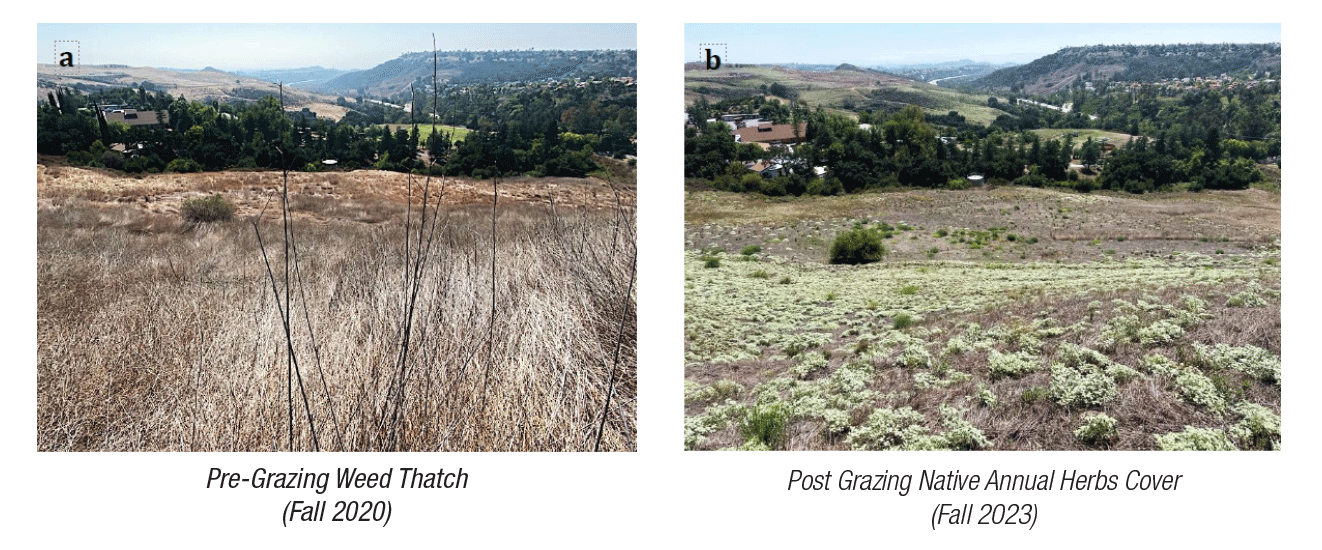Live Oak Cattle Grazing Program
The Foothill/Eastern Transportation Corridor Agency (F/ETCA) Board of Directors unanimously approved targeted cattle grazing as part of Transportation Corridor Agencies’ (TCA) Adaptive Weed Management Program for its mitigation sites. The decision follows the successful three-year cattle grazing pilot program at the 23-acre Live Oak Plaza Conservation Area, re-zoned to preserve open space near Trabuco Canyon. It is one of the 17 mitigation sites, and nearly 2,100 acres TCA restored and conserved for future generations.
The Live Oak Cattle Grazing Program showed positive results in terms of reducing flashy fuels and associated fire risks from the accumulation of nonnative plant cover, increasing bare ground and promoting a shift toward native annual species. Program monitoring also indicated that additional measures are needed for the site to be self-sustaining and to fully meet the Agency’s conservation goals.

Moving forward, the Board-approved program will aim to utilize cattle grazing as an annual weed abatement option at Live Oak to encourage repopulation of native perennial grass and shrub cover by reducing competition with nonnative annual plants. TCA will evaluate the potential to use cattle grazing as a weed abatement option for existing and future mitigation sites. Lastly, it was recommended that a diverse native seed mix be installed at Live Oak Plaza to complement the weed management efforts to increase site use by sensitive grassland bird species.
TCA is committed to exploring cost-effective and alternative ways to reduce fuel loads and nonnative plant species at the mitigation sites managed by the Agency, as part of our strategic environmental initiatives.
Fitch Ratings Upgrade
 TCA Chief Executive Officer (CEO) Ryan Chamberlain shared Fitch Ratings recent upgrade for the Foothill/Eastern Transportation Corridor Agency (F/ETCA) toll revenue bonds:
TCA Chief Executive Officer (CEO) Ryan Chamberlain shared Fitch Ratings recent upgrade for the Foothill/Eastern Transportation Corridor Agency (F/ETCA) toll revenue bonds:
- Senior Lien bonds improved from BBB+ to A- with a positive outlook
- Junior Lien bonds improved from BBB to BBB+ with a positive outlook
According to a statement from Fitch, the ratings upgrade reflects an improved credit profile driven by the agency’s prudent debt management strategies – which includes recent bond buybacks and strong traffic and revenue performance.
Fitch Ratings also reaffirmed San Joaquin Hills Transportation Corridor Agency (SJHTCA) senior bonds at BBB+ and junior bonds at BBB and revised the rating outlook to positive.
As part of the board approved Strategic Plan goal of debt reduction, it is anticipated that the SJHTCA will have the opportunity for an early bond paydown of $200 million in Fiscal Year 2025.
National Interoperability Concept
The Boards of Directors approved TCA staff to pursue implementation of a one-way interoperability concept in partnership with the Washington State Department of Transportation (WSDOT) and North Texas Transportation Authority (NTTA). In addition, the Boards of Directors approved steps be taken to position TCA to serve as the Western Regional Hub for full interoperability.
The federal transportation reauthorization bill, known as MAP-21 and passed in 2012, included a mandate requiring tolling agencies across the United States to become interoperable with each other. However, due to state legislative restrictions, California tolling agencies cannot fully implement national interoperability until a legislative fix occurs. Given the potential benefits of increased convenience to customers and to keep momentum moving forward towards full national interoperability, TCA staff proposed implementing a one-way interoperability concept with tolling agencies outside California. The one-way interoperability concept would be in accordance with existing statute and would allow The Toll Roads accountholders to use tolling facilities in Washington and Texas and have tolls billed to their Toll Roads account, enhancing mobility and providing added convenience.
Moving forward, TCA will continue to participate in the National Interoperability Working Group (NIWG) and work with Western Region Toll Operators (WRTO) on regional hub alternatives. In addition, the Agencies will work with other California Toll Operators Committee (CTOC) agencies to support legislative work to meet national interoperability requirements.